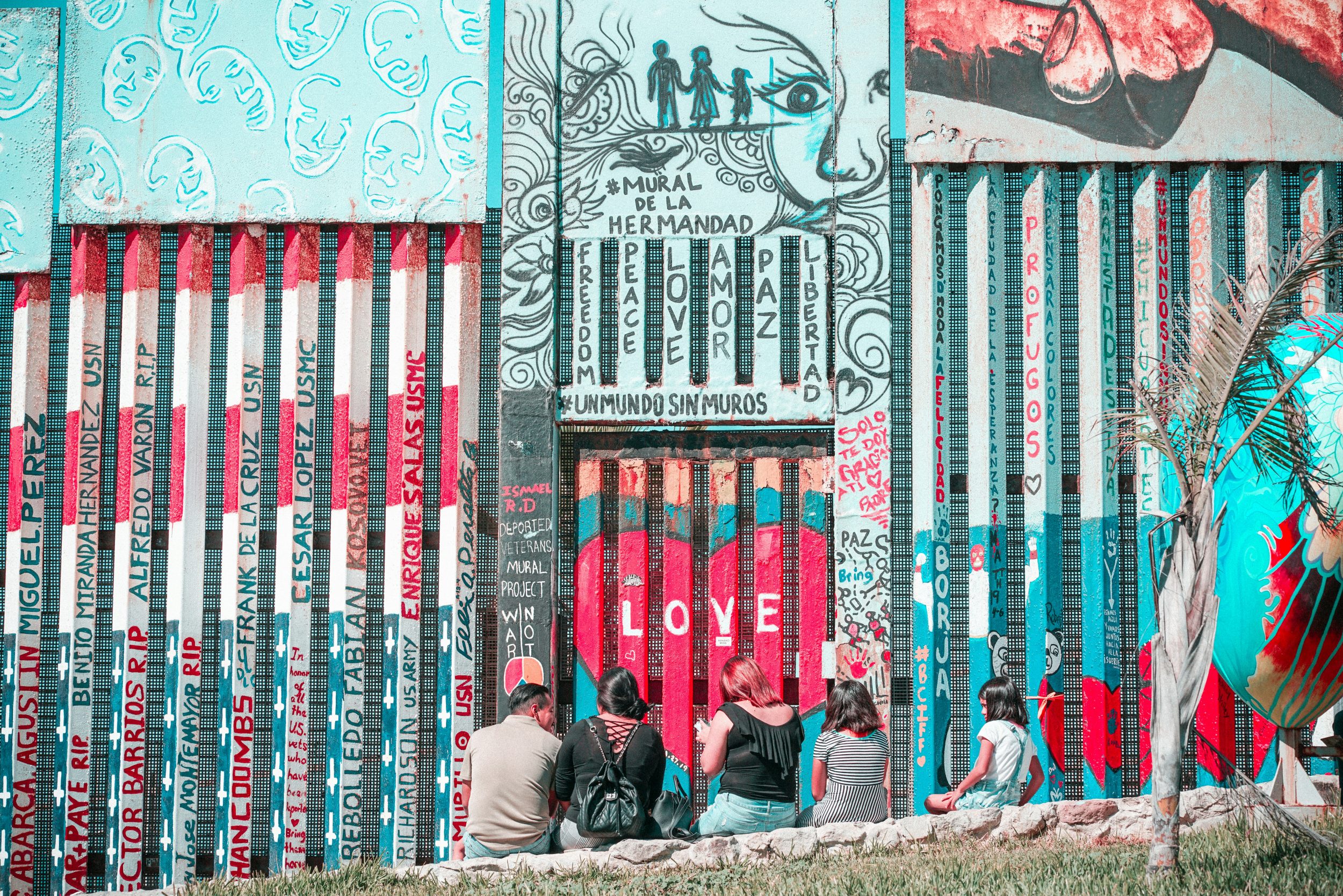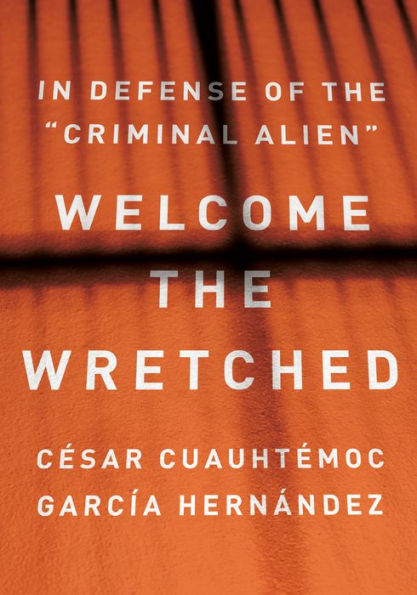Welcome the Wretched: In Defense of the “Criminal Alien”
César Cuauhtémoc García Hernández
The New Press (hardcover, $27.99)
When a single mother of twins sells everything she owns and sends her children to a nation thousands of miles away, on their own, in search of a different future, she’s not preoccupied with whether her plan is lawful or not. And in the event she does think about the legality of her plan—taking stock of the laws, policies, and enforcement apparatus that may one day criminalize her sons, imprison them, and send them back—she measures the cost and resolves to go through with her decision. Her sons’ futures matter more.
I couldn’t shake off thinking about that single mother—my own—when reading César Cuauhtémoc García Hernández’s third book, Welcome the Wretched. This work is a full-throated defense of people like her—and the millions who have journeyed to the United States, no matter the risks, because the alternative was unthinkable. Or, in their considered judgment, far less perilous than staying put. Restrictions, criminal or otherwise, won’t deter them. In the history of immigration enforcement, García Hernández contends, what counts as lawbreaking is as arbitrary as the laws themselves.
If there’s something missing from debates about immigration law and policy, which have tribalized our politics for decades, it is an acknowledgment of this fundamental reality: Someone’s decision to migrate, like deciding whom to marry or whether to have children, is at bottom a human and deeply personal decision. To deny anyone the right to set the course of their own life is to deny them their humanity.
Yet deny we do, going so far as to build walls, criminalize the act of crossing the border, and invoke public health statutes to expel migrants as if they were a disease. There’s no shortage of creativity in the push to keep out undesirables: At the behest of Texas, one federal appeals court is currently entertaining the argument that the Constitution justifies treating them like invaders, in the armed-conflict sense.
It is no surprise then that the law, as García Hernández shows in great detail, contains multitudes of prohibitions on migration. And if the law does not outright limit who may or may not enter or remain in the nation, there are other barriers that lawmakers have erected to keep them from full membership in the national polity—or to make their lives so miserable as to drive them out. That the law calls these tired, poor, and huddled masses aliens is, in a real sense, the least of their concerns.
Key to this toolset, García Hernández argues, is criminal law. “As with so much else, where Congress and the president see a problem, police, prosecutors, and prisons are their preferred answer,” he writes early on in Welcome the Wretched. Yet as he examines the history of crimmigration, García Hernández, who once wrote a whole treatise on the subject, makes plain that the very idea of criminalizing noncitizens en masse was once a foreign concept.
True, the United States has never really moved past its racialized treatment of people seeking refuge or better opportunities upon its shores, and its laws have often reflected odious distinctions based on race, national origin, and gender. But as García Hernández showed in his earlier call for abolishing immigration detention, and does again in Welcome the Wretched, the historic norm has been no criminalization—that is, for criminal law to have no bearing on a person’s immigration status. There was even a time in the 1950s and ’60s when U.S. officials saw the imprisonment of migrants unfavorably, almost ending this social experiment in its entirety.
More from our decarceral brainstorm
Every week, Inquest aims to bring you insights from people thinking through and working for a world without mass incarceration.
Sign up for our newsletter for the latest.
Newsletter
What changed this trajectory, in García Hernández’s tracing of the history, was the backlash to the politics of the civil rights era, followed by the hysteria of the war on drugs and the onset of our era of mass incarceration. As anti-Black sentiment ran rampant during this period, so did politicians’ distaste for seeing migrants from Latin America and the Caribbean—among them Haitians and Cubans demanding compassion for their political situation—constantly in the news. With maddening speed and bipartisan support, immigrants soon found themselves caught up in the battery of laws Congress passed in the 1980s and ’90s to deal with crime and boost policing and prisons. Before long, mandatory detention, “aggravated crimes,” the deputization of local agencies in immigration enforcement, and near-certain deportation became fixtures of the U.S. code, empowering officials with breathtaking and unprecedented discretion to detain and expel people.
Another thing that changed: Toward the end of the second Bush presidency, federal prosecutors saw fit to dust off a law that more or less sat dormant for nearly a century, one that criminalized migration itself. Now this statute constitutes the most common criminal charge in the federal court system, with prosecutors wielding it to the tune of tens of thousands of cases filed every year. This is a political choice, made and remade anew across administrations both Republican and Democrat—and one that has done next to nothing to keep people from crossing the border without authorization.
Welcome the Wretched demonstrates how everyone who has chosen to call the United States their home—like those waves of European migrants who preceded them in the early days of the republic—is unexceptional. Leveraging real-life stories from his own interviews as well as from history and popular culture, García Hernández establishes that citizens and noncitizens alike are all in the same boat, splashing about, hoping to stay afloat. We’re all human, we’re all messy, and we all break laws, whether we’ll admit it or not. Why, then, do we hold immigrants to standards that we ourselves cannot live up to? As García Hernández puts it, “When it comes to migrants, immigration law demands of them the exceptionalism U.S. citizens imagine in ourselves.”
In attacking the myth of exceptionalism, García Hernández here reminds me of the work of Ruth Wilson Gilmore and other abolitionists who have a problem with innocence as the guiding metric for determining who “belongs” in a cage. Under this framework, sorting people into categories helps no one, lawfulness is in the eye of the beholder, and criminalizing migrants serves no purpose other than to score political points and pretend authorities are tackling a social problem that won’t go away.
Why, then, do it at all?
Having established that crimmigration enforcement is arbitrary and politically driven, García Hernández calls for scrapping all the laws and mechanisms that got us to the criminalizing regime we have today. Looking to the works of W. E. B. Du Bois, Angela Y. Davis, and Mariame Kaba, he writes that “it’s possible to begin the long march toward an immigration legal process that bolsters justice and legality while reducing harm.” He doesn’t offer much in the way of specifics for what that might look like, and he allows that his proposed rollbacks aren’t politically feasible at the moment.
Later, he devotes a chapter to a “reimagined” conception of citizenship—his retelling of New York activist Ravi Ragbir’s near-deportation experience, and his community work around it, is a highlight. Ragbir is only one example of immigrants’ rights organizers, many of them undocumented or under government scrutiny, who aren’t waiting for Congress to decriminalize their status or grant them a path to citizenship in the quest for a decarceral, abolitionist future for all—not just for people like them. García Hernández highlights some, but their stories alone could fill volumes. These organizers, whether imprisoned or free, are already reimagining what belonging to a country that doesn’t want them means: They are working to end immigration detention and shutting down decrepit facilities, so as to keep families together; getting their communities to cut ties with ICE, thus disempowering local policing and jails; mobilizing for driver’s licenses so they can go to work; unionizing for better pay and working conditions; and, in some states and localities, even pushing for legislation allowing them to vote in local elections.
As Ángela Cházaro has written, there’s no daylight between migrant justice and the tearing down of the institutions and practices that harm Black and immigrant communities alike. For these communities, their collective freedom is intertwined, and working toward it begins now.
Image: Barbara Zandoval/Inquest


